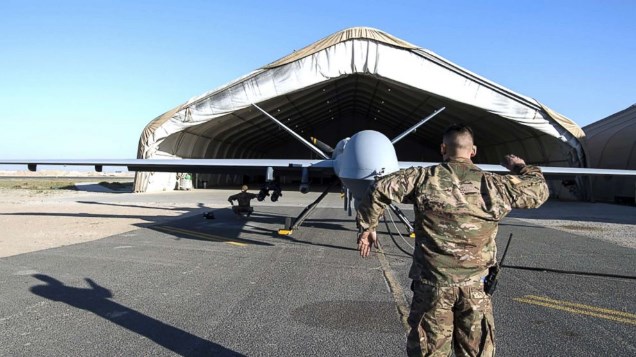
Monday April 27, 2020
An American military airstrike in Somalia more than a year ago killed two civilians and injured three others, U.S. Africa Command is acknowledging in a new report expected on Monday.
The deaths, confirmed by an internal investigation, mark only the second time Africa Command has determined that civilians were killed in a military strike in Somalia. The decision comes even as U.S. airstrikes against the al-Qaida linked al-Shabab extremist group this year are increasingly outpacing 2019 totals. Already there have been 39 airstrikes in 2020, compared to last year's total of 63.
Maj. Gen. William Gayler, director of operations for Africa Command, told The Associated Press in an interview that the strike on Feb. 23, 2019, in Kunyon Barrow, targeted and killed two members of al-Shabab.
When online allegations of civilian casualties in that strike were received soon afterward, the command investigated, but the review dragged on for more than a year. After another similar allegation about that strike came in early this year from a non-governmental organization, the military continued its assessment, and it finally determined that at least one other person was killed or injured.
Gayler said the command could see video showing a person — an apparent civilian — being carried from the site.
"We didn't see the other individual or the wounded individuals. But because we're trying to be transparent and as open as we can, when we know that we've more likely than not killed the one male, why would we dispute the other killed and three wounded," he said. So, officials decided to substantiate the allegations in total.
He said the deaths and injuries were likely due to secondary explosions from munitions stored at the site by al-Shabab. The extremist group controls parts of central and southern Somalia and often targets the capital, Mogadishu, with suicide bombings.
Asked why the investigation took so long, Gayler said it was an effort to be thorough and "some of the means we use to assess don't normally happen quickly." He did not provide details but noted information is gathered through classified means.
He added, however, that there's no reason it should take that long. And he said Gen. Stephen Townsend, head of Africa Command, is adamant that investigations must be wrapped up more quickly in the future. Townsend also ordered quarterly reports on civilian casualty allegations, much like U.S. Central Command does for Middle East military operations.
"While we follow very precise and rigorous standards, in instances where we fail to meet our expectations, we will admit the mistake," Townsend said. "We have the highest respect for our Somali friends, and we are deeply sorry this occurred."
Africa Command's first civilian casualty report, which is being released Monday, covers the time period from February 1, 2019, to March 31, 2020. According to a copy reviewed by the AP, there were 91 airstrikes in Somalia and Libya during that time. The command has completed reviews of 20 alleged incidents of civilian casualties during that time and substantiated only the February 2019 one.
In many of the claims the command found that the U.S. military had conducted no airstrikes on the day in question. In other cases, it determined that those killed or injured were only al-Shabab targets.
Gayler also said that al-Shabab and its backers often make false claims on social media sites. And, like many militant groups, al-Shabab also often blends in with local citizens, using civilians as shields or including members that also masquerade as regular business people.
Civilian deaths, however, have been a persistent problem for the military in war zones around the world. And watchdog organizations routinely complain that the U.S. and other militaries don't acknowledge civilian deaths as quickly or completely as needed.
Amnesty International said in a report early this month that two airstrikes in Somalia in February killed two civilians and injured three others. The group said that one airstrike, on Feb. 2, struck a home in the Middle Juba region, killing an 18-year-old woman and wounding her two sisters and her grandmother. The second strike, on Feb. 24 near Jilib, killed a farmer who also worked for Hormuud Telecom, Somalia's largest telecom company.
Gayer said those two are among seven other cases still being investigated.
The only other substantiated instance of civilian casualties in Somalia was acknowledged by the command last year and occurred on April 1, 2018. In that case, two civilians were mistakenly killed by a strike near El Buur.
"The growing threat in Africa from terrorist networks is significant and impacts not only Africans but also the U.S. and our international allies," said Townsend, adding that the strikes "follow a strict, disciplined and precise process."
There are between 6,000 and 7,000 U.S. forces on the continent at any time, including about 4,000 who are at the U.S. base in Djibouti. Other forces train and advise local forces and conduct counterterrorism missions against militants, such as al-Shabab in Somalia and other al-Qaida-linked groups and Islamic State affiliates in west and north Africa.